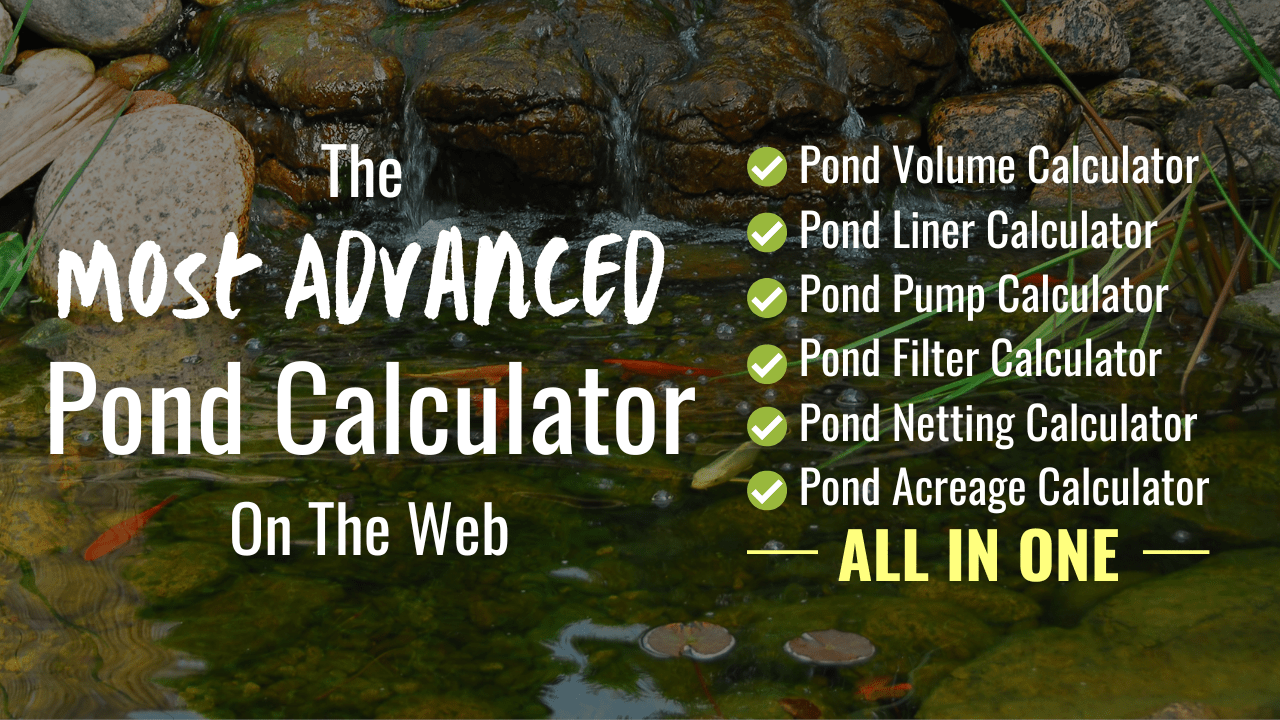Pond Calculator (All-In-One)
Quickly calculate everything you need to know about your pond! Simply select the options that best fit your pond, enter the measurements, and click CALCULATE.
Step 1: Choose Your Pond's Shape
Step 2: Do You Have Fish?
Step 3: Enter Your Pond's Measurements
About Our Pond Calculator

The Pond Academy pond calculator, aka The Pond Acalculator™, is an advanced, yet super-simple-to-use calculator that will tell you everything you ever needed to know about your pond (and probably more than you ever wanted).
Along with your pond’s volume (liters, gallons, and even imperial gallons), we show you what size pond pump you should run, how big of a pond liner you’ll need (very handy if you’re still building or redoing your pond), the size netting you’ll need to protect your pond from debris and predators and the correct filter size to ensure your pond is healthy and clean. And what the hell, we’ll even throw in how many acres your pond is and how many tons of rock you'll need!
But, wait! There’s more… we even recommend the best products for your pond based on your pond's unique specifications!
Please read on to learn more about each individual pond calculation along with other important considerations you may need to take into account.
Pond Pump Size
Choosing the right sized pond pump for your pond is extremely important.
Whether you plan on using it for water filtration, pond aeration, or simply run a fountain or waterfall, you’ll want to make sure your pump has the power needed to fulfill its duty.
Typically, you’ll want your pond pump to be able to completely turn over your pond every 1-2 hours. What this means is that if you have a 1000-gallon pond, you’ll want a pump rated at 500 – 1000 gallons per hour (GPH).
Our calculator will help you figure out your pond’s volume and calculate the size of the pond pump you’ll need based on other factors like the number of fish your pond has.
But, there are some other factors you may want to keep in mind if you want to really fine-tune your pond pump calculation, like static head or head height and other losses.
For example, if you are pumping water higher than the surface of your pond, you will inevitably run into performance losses. The higher the water has to be pumped, the more loss you will run into.
Other losses will come from hose friction. A general rule of thumb is that every 10 feet of hose are equal to a foot of static head. So, when looking at your pump’s specifications, you’ll want to make sure it can still deliver the flow rate you want given the static head the water will encounter.
When in doubt, bigger is usually better in this case.
Once you've calculated your pond pump needs, go check out our guide to the best pond pumps on the market today.
Pond Liner Size
If you’re still in the early stages of building a pond or you are redoing/remodeling a pond, then our pond liner size calculator will ensure you get the right-sized liner for your pond. To accurately calculate pond liner size, we take into account your pond’s max length, width, and depth, and tack on an extra 2 feet on the length and width to allow for proper overlap.
Your pond liner to your pond is like the foundation is to your house. You’ll definitely want to make sure it’s sized right and there are no leaks, which could be catastrophic to your pond’s ecosystem and any pond fish or other wildlife if there was. If you ever do suspect there is a leak, check out our guide on how to find a leak in a pond in two simple steps (and quickly repair it).
Once you know the exact size liner you'll need, check out our guide to the best pond liners on the market today.
Pond Netting Size
If you struggle with falling debris or pesky predators constantly invading your pond, then pond netting might be your saving grace! Our calculator will ensure you get the properly sized net to cover your pond and help protect it.
And be sure to check out our pond net reviews before you run out and grab one.
Pond Filter Size
Pond filters a great addition to any pond if you want to keep the water as clean and clear as possible. They effectively remove unwanted debris and can help encourage beneficial bacteria growth. But, to be most effective, the filter should fit the pond.
Our calculator returns the smallest sized filter you will want to buy. And remember, each filter is different and handles fish loads differently. Always look at the filter specifications, as they should tell you exactly what that particular filter is rated for, especially under different fish loads. And make sure your pond pump isn’t rated at a higher GPH than your filter can handle.
Finally, head over and read our reviews and comparisons of the best pond filters available.
Pond Volume
The basis of many of our pond calculator’s calculations starts with figuring out a pond’s volume. It’s an extremely important figure to know, especially if you’re trying to maintain a clean and healthy pond ecosystem.
Your pond’s unique volume is important in helping you figure information such as the right amount of water treatment you need to apply to how many fish your pond will safely contain… and much more.
Not knowing your pond’s volume and just taking the best guess in how much algaecide you should use to treat your pond, or how many koi your pond will hold, can be detrimental to the health of your pond and fish if you happen to over (or even under) dose it.
It also comes in handy when applying pond dye or beneficial bacteria, to help ensure you use the right amount. Too little and you might not get the effect you want. Too much and you’re basically just throwing money away.
Our pond sizing calculator has an accurate, built-in:
- Pond Gallons Calculator
- Pond Imperial Gallons Calculator
- Pond Liters Calculator
Pond Acreage
Sometimes you just need to know how many acres your pond is! And we’ve got you covered!
Like our pond volume calculation, this measurement can come in handy if you have a large pond and you’re trying to figure out how much algaecide or pond dye you will need to use, etc.



